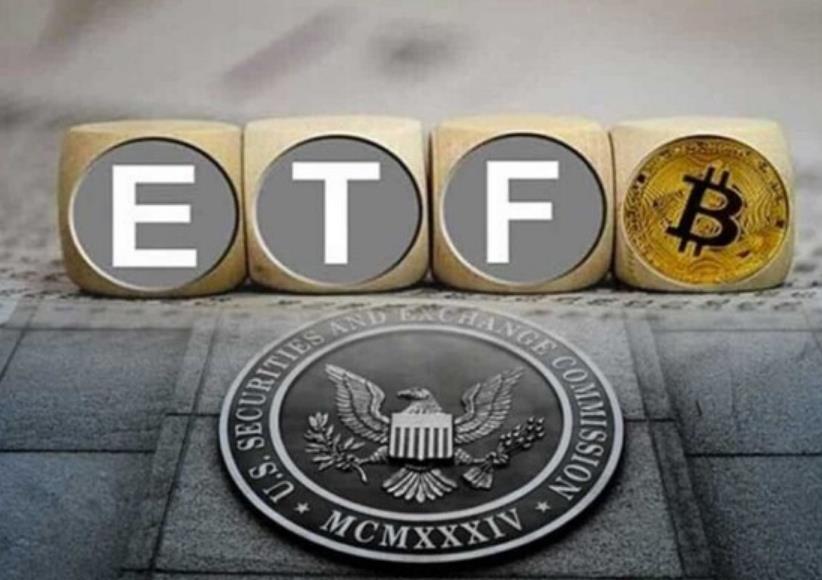Bitcoin ETFs are exchange-traded funds that invest directly in the largest cryptocurrency by market capitalization. They allow investors to gain exposure to Bitcoin without having to buy, store, or manage the digital asset themselves. Bitcoin ETFs also provide more liquidity, transparency, and regulatory oversight than other crypto investment vehicles, such as trusts or futures.
Bitcoin ETFs have been a long-awaited and highly anticipated development in the crypto industry, as they could potentially boost the adoption, legitimacy, and demand for Bitcoin among institutional and retail investors. Many crypto enthusiasts believe that Bitcoin ETFs could usher in a new era of innovation and growth for the digital asset space.

How did Bitcoin ETFs debut on Wall Street?
On Wednesday, January 11, 2024, the U.S. Securities and Exchange Commission (SEC) approved the first two Bitcoin ETFs in the country: the BlackRock Bitcoin ETF (ticker BBT) and the Ark Bitcoin ETF (ticker ABT). The SEC’s decision came after more than a decade of efforts and applications by various crypto firms and issuers, who faced multiple rejections and delays due to the agency’s concerns over market manipulation, fraud, and volatility.
The next day, Thursday, January 12, 2024, the two Bitcoin ETFs went live on the New York Stock Exchange (NYSE) and the Nasdaq, respectively. They were joined by three more Bitcoin ETFs that also received the SEC’s approval: the Invesco Bitcoin ETF (ticker IBT), the WisdomTree Bitcoin ETF (ticker WBT), and the VanEck Bitcoin ETF (ticker VBT). All five Bitcoin ETFs track the performance of the Bloomberg Galaxy Bitcoin Index, which measures the price of Bitcoin based on multiple exchanges.
The debut of the Bitcoin ETFs was met with overwhelming enthusiasm and excitement from the crypto community and the broader market. Reportedly, Thursday’s debuts included some record-breaking activity, such as:
- The BlackRock Bitcoin ETF, the first and largest Bitcoin ETF, traded more than $1.1 billion worth of shares on its first day, making it the most successful ETF launch in history.
- The Ark Bitcoin ETF, the second Bitcoin ETF, traded more than $500 million worth of shares on its first day, making it the second most successful ETF launch in history.
- The Invesco Bitcoin ETF, the third Bitcoin ETF, traded more than $300 million worth of shares on its first day, making it the third most successful ETF launch in history.
- The WisdomTree Bitcoin ETF and the VanEck Bitcoin ETF, the fourth and fifth Bitcoin ETFs, traded more than $100 million and $50 million worth of shares on their first day, respectively.
- The five Bitcoin ETFs collectively accounted for more than 10% of the total ETF trading volume on Thursday, surpassing the combined volume of the S&P 500 ETF (ticker SPY) and the Invesco QQQ Trust (ticker QQQ), two of the most popular and liquid ETFs in the market.
What are the implications and challenges of Bitcoin ETFs?
The launch of the Bitcoin ETFs is widely seen as a historic and positive event for the crypto industry and the Bitcoin market. Some of the potential benefits and implications of Bitcoin ETFs are:
- They could attract more institutional and retail investors to Bitcoin, especially those who are looking for a convenient, regulated, and diversified way to access the crypto market.
- They could increase the liquidity, efficiency, and stability of the Bitcoin market, as they would reduce the reliance on unregulated or illiquid platforms and intermediaries.
- They could enhance the innovation and competition in the crypto space, as they would encourage more issuers and providers to offer new and improved products and services related to Bitcoin and other digital assets.
- They could boost the price and adoption of Bitcoin, as they would increase the demand and supply of the cryptocurrency, as well as its visibility and awareness among the mainstream audience.
However, the Bitcoin ETFs also face some challenges and risks, such as:
- They could expose investors to the high volatility, unpredictability, and complexity of the Bitcoin market, which could result in significant losses or fluctuations in their returns.
- They could incur higher fees, taxes, and expenses than other crypto investment vehicles, such as trusts or futures, which could erode their performance and attractiveness.
- They could face regulatory uncertainty, scrutiny, and intervention from the SEC and other authorities, who could impose new rules, restrictions, or sanctions on the Bitcoin ETFs or the underlying market.
- They could encounter technical issues, operational failures, or security breaches, which could disrupt their functioning, trading, or custody of the Bitcoin assets.
What are the future prospects and trends of Bitcoin ETFs?
The Bitcoin ETFs are expected to continue to grow and evolve in the coming months and years, as more issuers, investors, and regulators join the fray. Some of the future prospects and trends of Bitcoin ETFs are:
- More Bitcoin ETFs could be launched in the U.S. and other markets, as more applicants and jurisdictions seek to capitalize on the booming demand and opportunity for crypto exposure.
- More innovation and differentiation could be seen in the Bitcoin ETF space, as more issuers and providers seek to offer new and improved features, strategies, and solutions for crypto investors.
- More competition and consolidation could be seen in the Bitcoin ETF space, as more issuers and providers seek to gain market share, lower costs, and increase efficiency in the crypto market.
- More integration and collaboration could be seen in the Bitcoin ETF space, as more issuers and providers seek to leverage the existing infrastructure, expertise, and network of the traditional financial industry.
The Bitcoin ETFs are a milestone and a catalyst for the crypto industry and the Bitcoin market. They represent a new and exciting way for investors to access and benefit from the digital asset space. They also pose new and complex challenges and risks for the crypto market and its participants. The Bitcoin ETFs are likely to shape and transform the future of crypto investing and innovation.
